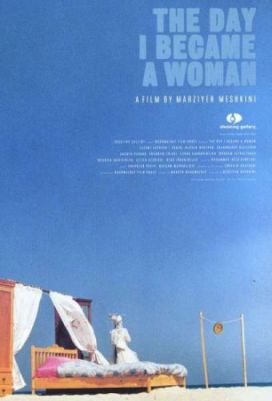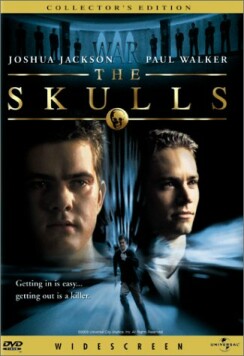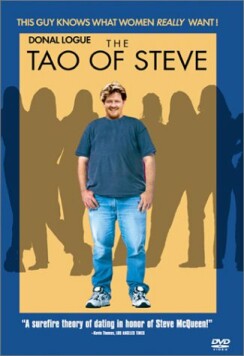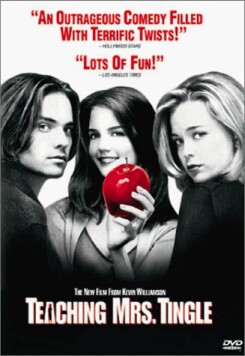Day I Became a Woman, The
Earlier this year, in a review of Panic by Henry Bromell, I observed that it was possible to appreciate a film which is an impressive bit of propaganda for a political position with which you profoundly disagree. Just think of Leni Riefenstahl’s The Triumph of the Will. Nowadays, the most assiduous ideologues among film-makers are feminists, and the best of these come from countries where women really do have something to complain about. Two recent Iranian films illustrate the point. Like Bromell’s movie, Jafar Panahi’s The Circle and Marzieh Meshkini’s The Day I Became a Woman direct their fire at what the feminists have taught us to call the “patriarchy,” but this is a patriarchy—enforced by the Muslim clergy upon a hitherto partially-modernized Iran for the past 23 years—that is a patriarchy and proud of it. But those of us who don’t have any stake in the success or failure of Islamic law will find it easier to go with the flow of this film than it would be for a pious believer in the Koran.
For even conservative Westerners can hardly be very pleased by the image of institutional male supremacy as presented in these two films—which of course is the point. You won’t see here any women who are happy to be subordinate to their husbands or fathers or content to be relegated to the home and child-rearing, though there are presumably one or two such to be found even in Iran. The deck, in short, is stacked against the Koran and Islamic law, although the fact is likely to be more annoying to Muslims than to non-Muslims, who are therefore in a better position to appreciate the movies’ virtues. And these are considerable. The great achievement of both directors (Ms Meshkini’s film was written by her husband, Mohsen Makhmalbaf) is to make us care about their unhappy women as if they resembled real people instead of owing their existence, as we know they do, to their usefulness in illustrating a political argument.
Mr. Panahi’s film begins with nothing but a black screen and a soundtrack. Over the opening credits we hear, somewhere, the sounds of a woman in childbirth. With the end of credits come the film’s first articulate words: “It’s a girl.” It is at this point that we—like the new-born child liberated from the darkness—begin to see, perhaps metaphorically as well as literally. For we see a nurse telling the child’s grandmother that “It’s an adorable little girl.” Granny, however, is less than thrilled. “Are you sure?” she asks. “The ultrasound said boy. The relatives were expecting a boy. Now they’ll want a divorce.” Then, meeting her son-in-law’s family on their way into the hospital, she lies to them in order to escape from the womb-like hospital into the streets of Teheran, where most of the rest of the film takes place.
This is itself a daring statement, as the street is a public space where, in a country that so largely confines wives and mothers to the home, the presence of women still has some of the power to shock which is linguistically fossilized in the English word “streetwalker.” We see a woman being arrested for some unnamed crime while her two friends escape, one to try to travel alone to her native province, another to try to find an old lover. Granny is left to her anguish over the birth of her daughter’s daughter and these two women’s stories are each in turn taken up for a while. The rest of the film consists of a series of linked vignettes designed to show the gamut of social problems affecting women in Iran: one is seeking an illegal abortion and another is a victim of domestic violence, while a third is disowned by her family for obscure but (we gather) not uncommon reasons. A prostitute is arrested in the street as a single and friendless mother reluctantly tries to abandon her child so that it will get better care than she can give it.
In the end, all these women the threads of whose stories have been taken up and dropped in turn are brought together again in a powerfully symbolic representation of their common predicament. The Day I Became a Woman has a somewhat similar structure, but is much more subtle in making its point. In its first segment, a young girl is trying to understand why, on her ninth birthday, she is to have to don the chador and no longer be allowed to play with her male playmate. Finally she strikes a deal with her mother: as she wasn’t born until noon on this day nine years ago, she can continue to play with Hassan until noon—whereupon she must return home to a lifetime of segregation from men and close supervision of her contact with them. She takes with her a stick which, thrust into the ground, will tell her it is noon when it has no more shadow.
The poignancy of this little episode is emotionally if not intellectually conclusive. The traditional Islamic view of the proper position of women in society doesn’t stand a chance. In subsequent vignettes, a girl on a bicycle, riding with a lot of other girls on bicycles, is pursued by her husband and his brothers who are on horseback and who demand that she return to her family. Then an old woman arrives in the city with her life’s savings which, as she is escorted around the shops by street urchins eager for tips, she proceeds to spend on kitchen appliances. These she has set up for display on the beach, and then loaded onto a raft for transport back to her remote rural home. The striking visual nature both of the girls pedaling furiously on their bicycles and of the old woman sitting content on her raft full of expensive Western white goods makes a point about women’s lives in a traditional society as forceful as Panahi’s.
One thing I liked about these two movies was the sense they give one of the inevitability of Western-style social “progress,” at least in a world dominated by the Western-style popular culture of movies, music and television. One can hardly even imagine a cinematic apology for the Islamic (or, indeed, any other) patriarchy—assuming for the moment that patriarchy exists. Such a thing would be impossibly, well, uncinematic. In the classic distinction made by the art historian Wilhelm Worringer a century ago, the movies are essentially empathetic, rather than abstract. And empathy, itself a feminine virtue, will always overwhelm the masculine and abstract arguments for sexual differentiation and subordination on the silver screen. If you want to know how we got from a social system not completely unlike the Iranian to where we are now, just look at these two movies.
Discover more from James Bowman
Subscribe to get the latest posts to your email.







